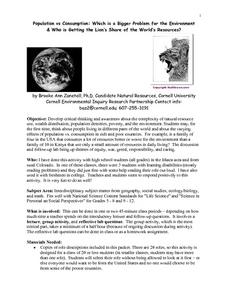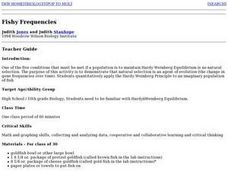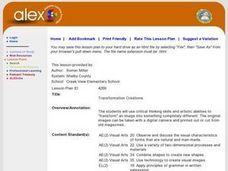C3 Teachers
2020 Protests: Is There Anything New about the 2020 Protests?
Are marches and protests an effective form of resistance? That is the question high schoolers seek to answer in this inquiry lesson as they compare the 2020 protests to historical ones. Researchers use Venn Diagrams to compare images...
C3 Teachers
Uncle Tom’s Cabin: Can Words Lead to War?
"Words, words, words." Despite Hamlet's opinion, words can be significant. In this inquiry lesson, middle schoolers learn how the words in Harriet Beecher Stowe's Uncle Tom's Cabin, in the view of many, lead to the American Civil War. To...
Curated OER
Book Project Lesson Plans
Long term book projects can help engage students and enhance their critical thinking skills .
Curated OER
Preschoolers and Science Skills
You can encourage critical thinking and problem solving by allowing young children to participate in hands-on science activities.
Curated OER
Understanding Social Commentary
By learning how to identify and understand social commentary students can flex their critical thinking skills.
Curated OER
The Lord of the Flies by William Golding
Tenth graders read and analyze the novel Lord of the Flies by William Golding. They examine the setting, plot, and climax in the novel. Character descriptions, good, evil symbolic images within characters are dissected in detail with...
Curated OER
Philanthropic Behavior/ Cooperative Learning
Students increase listening comprehension and use critical thinking skills to make a picture. In this philanthropic behavior lesson plan, students draw pictures in three parts. Each part is drawn by another students. Students share their...
Curated OER
Area of the Lawn Project
Students calculate simple area calculations in real-life situations. They determine simple wage computations. They use critical thinking skills. They demonstrate their ability to use writing in order to express mathematical thoughts and...
Curated OER
Population Vs Consumption: Which is a Bigger Problem for the Environment & Who is Getting the Lion's Share of the World's Resources?
Students develop critical thinking and awareness about the complexity of natural resource use, wealth distribution, population densities, poverty, and the environment. They think about people living in different parts of the world and...
Curated OER
Growing on My Own, Kids on the Grow
Students participate in an after school program that promotes critical thinking, concern for others, recognizing differences, accepting differences, self-motivation and personal safety. They cover how kids develop, expressing different...
Curated OER
Argumentation and Logic
Students recognize inductive and deductive reasoning and analyze common fallacies in critical thinking. In this argumentation and logic lesson, students use role playing activities and specific instances of inductive and deductive...
Curated OER
Fishy Frequencies
Tenth graders demonstrate that natural selection is an agent of evolution. They quantitatively apply the Hardy-Weinberg Principle to an imaginary population of fish. They utilize math and graphing skills, collecting and analyzing data,...
Curated OER
Sea Ice Board Game
Students understand the sea ice cycle and can explain its stages. In this Sea Ice lesson, students play a game to identify types of sea ice. Students answer critical thinking questions about sea ice. Students complete a sea ice worksheet.
Curated OER
Philanthropic Literature Lesson 1: The Lonely Fish
Students investigate the concepts of sharing and good citizenship, and how they contribute to a peaceful society. They work on problem solving and critical thinking skills after listening to Marcus Pfister's, The Rainbow Fish.
Alabama Learning Exchange
Transformation Creations
Learners "transform" an image into something completely different using critical thinking skills and artistic abilities. They improve skills in using digital cameras and word processors.
Curated OER
Vanishing Verbs
Students analyze recent media trends, and develop critical thinking skills by summarizing main ideas, extracting details, formulating opinions, drawing inferences, and comparing and contrasting attitudes. They also practice paraphrasing...

















